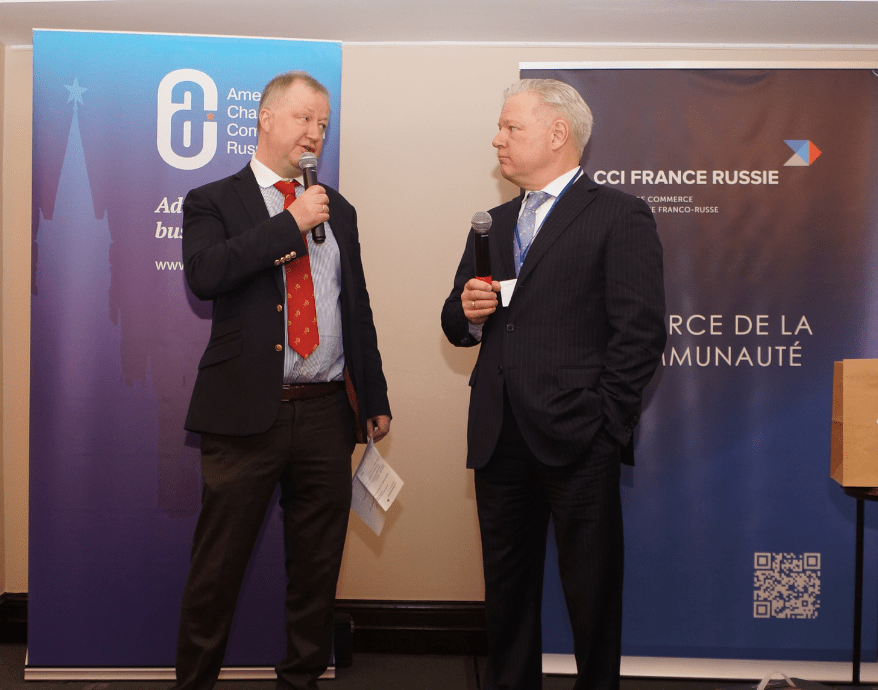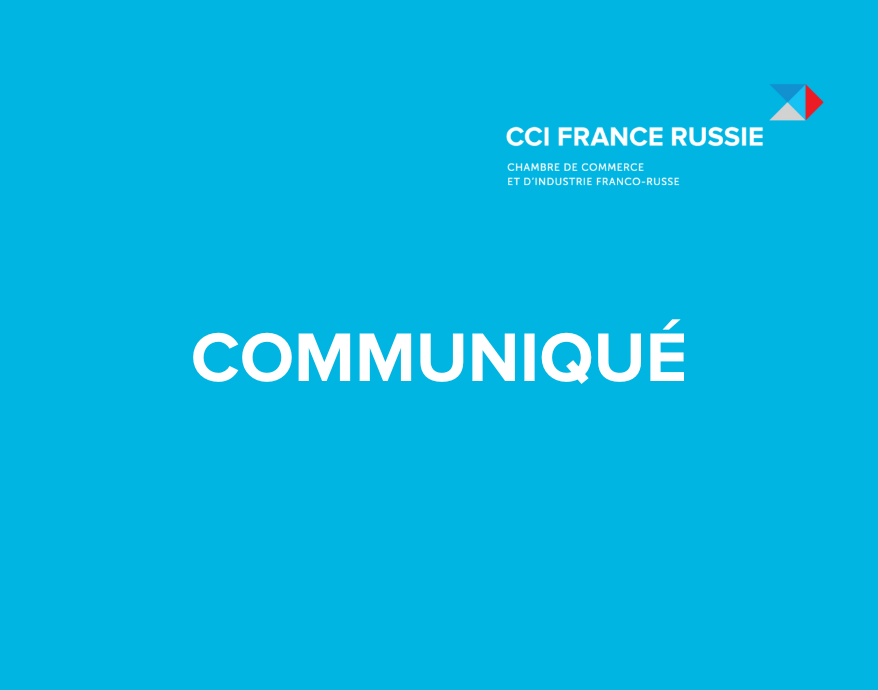“Do not try to work in all of Russia”
Oskar Hartmann, KupiVIP
“Mailing lists will soon wither away”
Mikhail Osin, Ozon
“eBay is preparing to open a fully localized site for Russians and also include Russian sellers”
Vladimir Dolgov, eBay in Russia
The co-organizers of the conference were the specialized publication East-West Digital News, which publishes research on this theme, the Franco-Russian Chamber of Commerce and Industry, within the framework of which operate the Luxury Committee and the Retail Committee, and the online marketing agency Buzzfactory.
In total more than 250 participants and 40 speakers attended the conference. The presentations of 7 online retailing start-ups (BuzzLink, Clickfrog, Deliverator, Fingo’s, Intelligent Emails, Kameleoon, and Multiship) occupied a prominent place.
The following presented in the plenary session: Sergey Onishenko, sales director at ComScore Russia, Kathrin Hille, head of the Moscow bureau of the Financial Times, Alla Katrenko, general manager of the Ukrainian Association of Direct Marketing, Adrien Henni, chief editor at EWDN, and Vyacheslav Buyevskiy, a PwC expert.
Sergey Onishenko presented an overview of global and domestic trends:
– Russia ranked second place in the world according to the growth of the presence of the population on the internet (Turkey is in first place, its average inhabitant spends 39 hours a month on the internet; in Russia he or she spends 37 hours and this is an increase of 12 hours compared to 2012);
– the most active category of people buying things on the internet is men between the age of 25 and 34;
– tablet users spend more on purchases than smartphone owners, but since there is a large number of smartphones, it works out that every 6 dollars out of 10 comes from sales via smartphones.
Alla Katrenko talked about the three main trends in Ukraine: major players are embracing new categories of goods and gradually turning into “internet-hypermarkets,” shopping with the help of social networking sites is quickly developing, and the volume of cross-border purchases rose to 26% in 2013 (it was 18% in 2012); in line with this, one of the most popular platforms is the Chinese internet store Alibaba.
Adrien Henni presented research in the format “Russian e-commerce today and yesterday.” According to him, potential purchsers are all internet users (there are 70 million in Russian + 20 million Russian speakers in neighboring countries, i.e. soon there will be no less than 100 million people). The tempo of growth of internet trade is about 30% per year, but for a complete picture it is necessary to add 2 billion for hotel and tour orders, as well as 3 billion for B2B sales and 3 billion for cross-border purchases to the official figure of a volume of 16 billion dollars.
“Before, logistics was a big problem for the development of the regions – either the ‘long’ Russian postal service or expensive private operators. But now thanks to development, logistics rates for fast and guaranteed delivery are only 25% higher than at the Russian Post Office. For KupiVIP two thirds of sales are shared by the regions and if if you see a different proportion for yourself, this means you are poorly serving the regions as far as delivery is concerned,” said Adrien. “There are 2 particularities for Russia: the development of ‘hybrid’ models for commerce companies (Ulmart, Enter, and many others) and the rule of ‘payment on delivery’ (80-90%), which is very slowly changing to internet payment.”
 |
 |
|||
| |
|
 |
The following participated in the 3 morning round tables: Vadim Fedotov, CEO of Groupon Russia, Igor Karpovich, head of strategic business development at Sberbank, Mikhail Osin, director of development at OZON, Martin Schierer, CEO of Otto Group, Sergey Fedorinov, CEO of Ulmart, Stephan Rothemaier, director of retail commerce at IKEA, Sergey Rumyantsev, president of Enter, Oskar Hartmann, president of KupiVIP, Boris Lepinskikh, CEO at e96.ru, and Fedor Virin, co-founder and chief analyst at Data Insight.
The participants discussed questions concerning the specificities of Russian electronic commerce, the transition from offline to online, and access to the regions. So, for Russia a characteristic problem is the problem of converting views to purchases as only 2 out of 100 goods viewed are actually bought; for access to the regions it is desireable to have versions of sites in the Russian language; long distances transform into the problem of “prices after delivery.” Also the practice of “collective purchases from across the border” has appeared in Russia, in which the margin between the price of purchases and sales is 300%. However market participants do not see a threat since such purchases have not attained more than 0.4% of the total volume of cross-border purchases.
Fedor Virin presented the following statistics: the average check in Moscow and Saint Petersburg is for 150 dollars and in the regions it is for 80-100 dollars; in the capitals 1 person makes 3-4 purchases per year but it is far less in the regions (for example, 1 purchase a year in Rostov).
But the participants did not bypass the issues which are most pressing for the industry today.
On particular, Martin Schierer commented on information about the establishment of a maximum (non-taxable) sum for cross-border purchases set at150 euros, saying “it is still a lot and should be 20 euros.”
Mikhail Osin answered audience questions about Ozon mailings: “I think that mailing lists will wither away soon as they annoy people.”
Stephan Rothemaier unveiled IKEA’s plans for internet sales in Russia: “IKEA had a system of internet sales in 13 countries out of the 35 that we are in and it had not been a priority for us. We have decided now that it must be prioritized – and in all 35 countries. We are currently studying the market and payment systems in Russia … We expect to launch a new platform by early 2016 and then switch to a multi-functional one.”
Sergey Rumyantsev announced the imminent publication of the results of internal research and also presented several excerpts from it. In particular, he showed that the future behavior of a purchaser is dependent on how he or she makes his first purchase on Enter. Out of 100 first purchases made on the internet, 88 will go on to make internet purchases and only 12 percent “switch to the store or Enter’s call center.” Of those who made purchases in the store, 73 percent continue loyal to in store purchases wihle 27 percent switch over to making purchases via the internet or call center. Likewise, according to Enter’s data, 10% of purchasers switch from one category of wares to the purchase of other commodity groups on their networks.
Boris Lepinskikh, the CEO of e96.ru, shared the example of his internet store, which came from one of the regions (Yekaterinburg) and now has 20 offices in Russia, 1,000,000 visitors, and a 4,600,000,000 ruble (133,900,000 USD) annual revenue.
Oskar Hartmann talked about the role that stereotypes played in the development of KupiVIP: “We dealt with a few stereotypes. First, if we do not rush into the regions then they will quickly copy us and become our competitors. Our conclusion was to not try and work throughout the entirety of Russia as this is economically inefficient but choose a zone instead. The second stereotype was that the regions are a desert and there is nothing there. Much is being done in the regions and people are putting big money there. Take for example the company DNS [in 1998 the company DNS opened its first computer store in the city of Vladivostok], which no one noticed, but it, coming from the east, reached Moscow [its condition at the beginning of 2014 is 718 cyber supermarket fronts in 250 cities in Russia]. And the third stereotype was that it is not possible to ensure security when working with cash money in the regions. This stereotype proved true. Therefore, everything macro is useless and the truth is in the details.”
Presenting in the niche round tables on marketing, payments, logistics, and delivery were: Jean-Stephane Bagoee, CEO of Intelligent Emails, Bas Godska, CEO of Acrobator, Timofey Shikolenkov, marketing director at Audiomania.ru, Victor Dostov, president of the Electronic Money Association, Maria Gracheva, general manager at Yandex Money, Vladimir Grankin, president of Ocean Bank, Elena Orlova, general manager at PayU Russia, Heli Aarnio, e-commerce devlopment manager at the Itella Corporation (Finnish post), Vyacheslav Ilyin, director of operations at Oriflame, Kirill Filchenkov, managing partner at B2C-PL, and expert on delivery issues Konstantin Yakunin.
Thus, according to Maria Gracheva, 87% of card transactions are cash withdrawals, so the the task of Yandex Money is then to attract this money from cash into the payment system. People do not trust electronic monies, and thus their type of “decision” can be a total rejection of cash payments.
According to logistics specialists, 1,000,000 packages a month is the minimum volume for a company to send in order to maintain its own service; for companies with a lesser volume it is more profitable to work with an outsourcer for delivery. If logistics companies received the majority of the work for delivery, then thanks to volume and optimization they could achieve a cost reduction. According to data from the Boston Consulting Group, the level of outsourcing of logistics in Russia is 2 times lower than in the world. If volume increases, companies can change their processes – delivery speed will increase and prices decrease. As a kind of alternative to outsourcing, Oskar Hartmann argued in favor of the “unification” of suppliers in order to improve logistics.
In Russia there are presently 10,000 settlements covered by alternative [to the Russian post] delivery and the market for packages shipped in Russia is 150,000,000. Thus, a simple calculation shows the the level of profitability of 1 small alternative point of delivery, and there are significantly more of them. This means that in the many other places in Russia there are no alternatives to the Russian post that makes deliveries over a period of several weeks.
 |
 |
 |
The last block of discussions was dedicated to cross-border trade and a look at the future of e-commerce in Russia.
Maxim Andryukhin, head of the Russian office of BayRu/Dostami, supported the implementation by the government of limiting imports without customs duties to 150 euros.
Vladimir Dolgov, CEO of eBay in Russia, said that ‘the impact of the new legislation in the sphere of cross-border purchases will be significant, but that it will not affect eBay as the majority of purchases made through the company do not exceed the proposed limit.” Also, in his opinion, the localization of sites is extremely important, and that is why in March 2013 they launched a mechanism allowing Russian-speaking purchasers to handle all activities on a mirror site (automatic translation to Russian). However the company is getting ready to not only open a fully localized site for Russians, but also to include Russian sellers on eBay. Additionally, eBay is not planning to change its system of advanced payment (notwithstanding the previously mentioned tradition in Russia of payment on delivery). “This is business, and we need to understand that this is profitable for us.” Prepayment reduces % of unredeemed orders and returns. The introduction of cash on delivery (COD) for cross-border trade causes a lot of problems. Goods being returned have to cross the border yet again, the person paying for it as well as the return delivery…”
The thesis that online retailers must start introducing companies from Russia to the foreign market was voiced in the speech of Alexander Ivanov, president of the National Association of Internet Trade (NAMO). He also spoke about the introduction of the restrictions which he expects as soon as this summer: “It is important to give a date of no less than 1 month so that the adressees of packages sent by the old rules also receive them under the old rules.
Jose Metz, CEO of La Redoute, shared his vision of the future: “Currently ordering through a website is a unique sort of problem and there are a lot of clicks. Is it possible to talk with a computer? Will future technology be able to do this? At the same time as introducing new technologies, we are talking about simpler websites for ordinary customers in the future. Moreover, a good internet store must be similar to a good salesperson in a store and it must convince me to buy more than what I came for – taking purchasing power into consideration of course. TV-commerce will be developed and social networking sites will be turned from discussion tools to selling instruments. And maybe someday people will print their orders on 3D printers.”
Niels Tonsen, the CEO of Lamoda.ru sees the future of his company in super fast delivery – within 2-3 hours to any destination.
In addition, the future is for personalization and that is why it is important to collect comprehensive information about each concrete client (though he or she might come to you on your site through various channels). Visual search will develop as well as thematic banners (related to visiting specific sites) and messages “on the move” (messages about relevant discounts and offers appearing when the customer nears a store or café).
The e-Days e-Commerce Conference organizers – CCIFR, EWDN, and Buzzfactory – thank the general sponsor of the conference – PayU, as well as the companies MaxiPost, Intellegent Emails, Multiship, Borenius, Arvato, and Kameleoon for their support of the event.

















